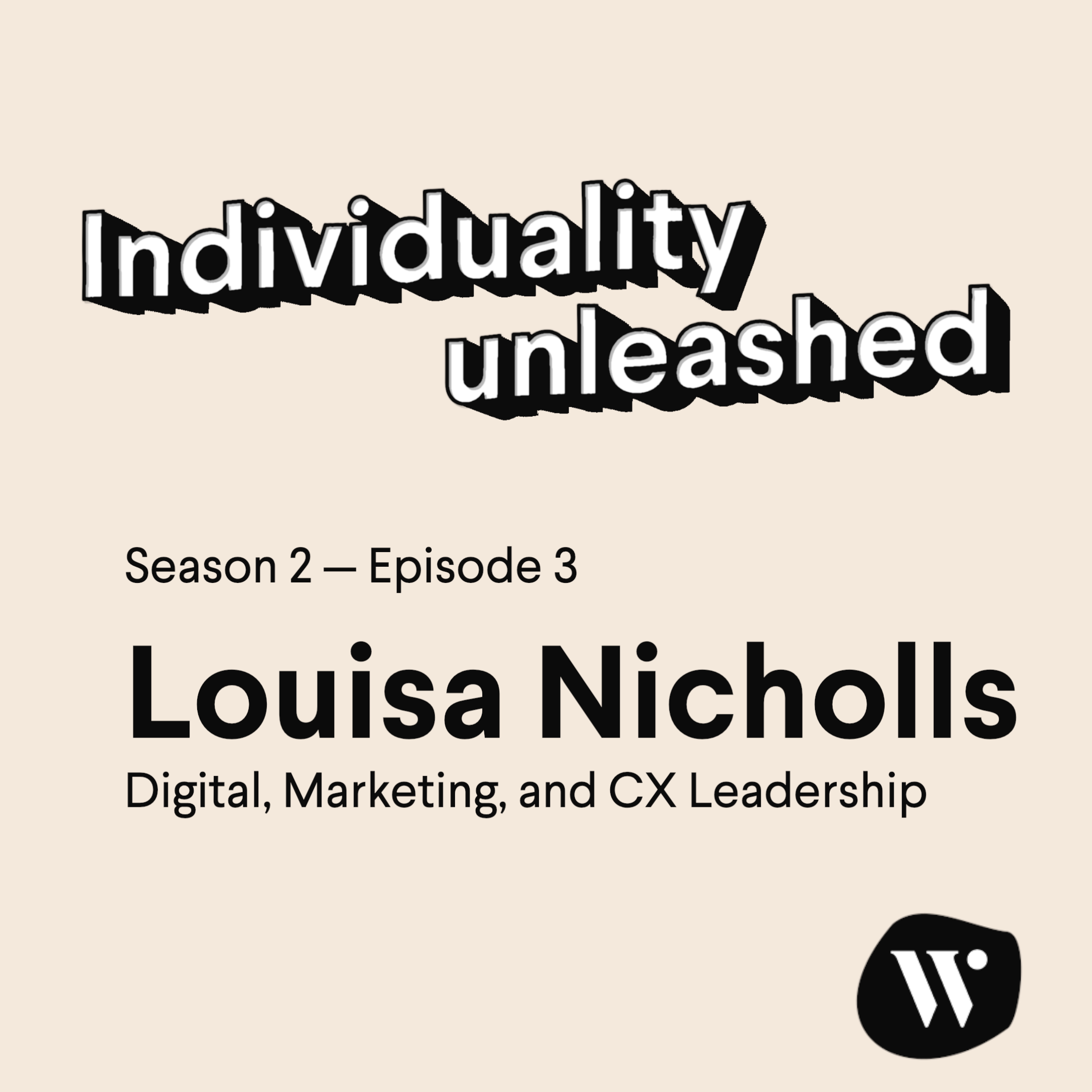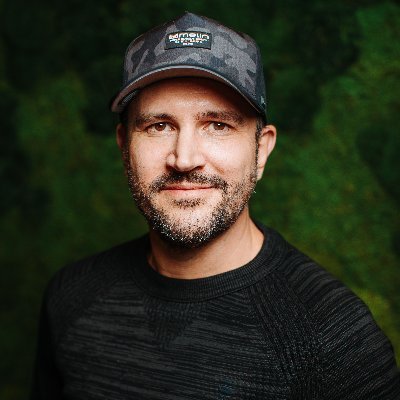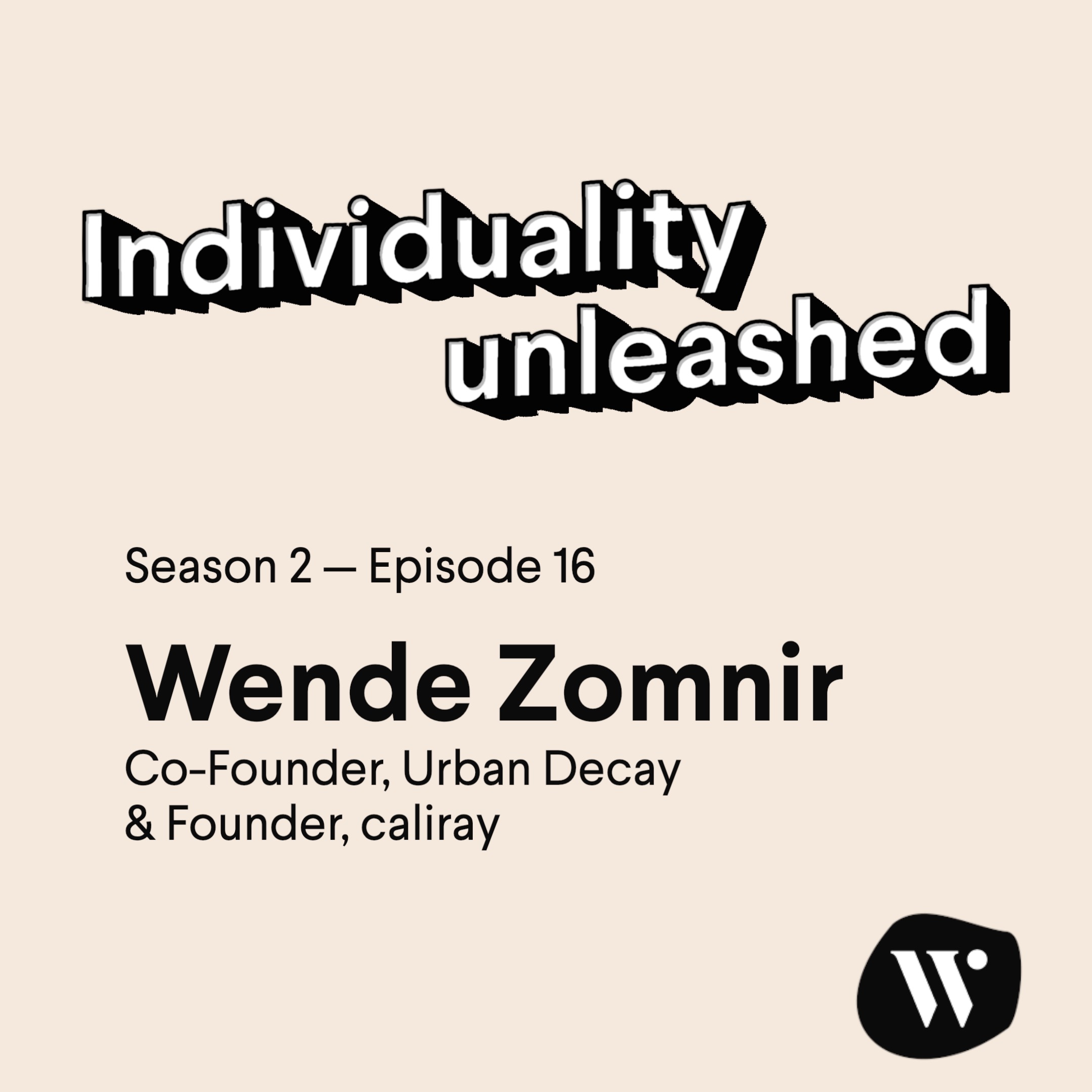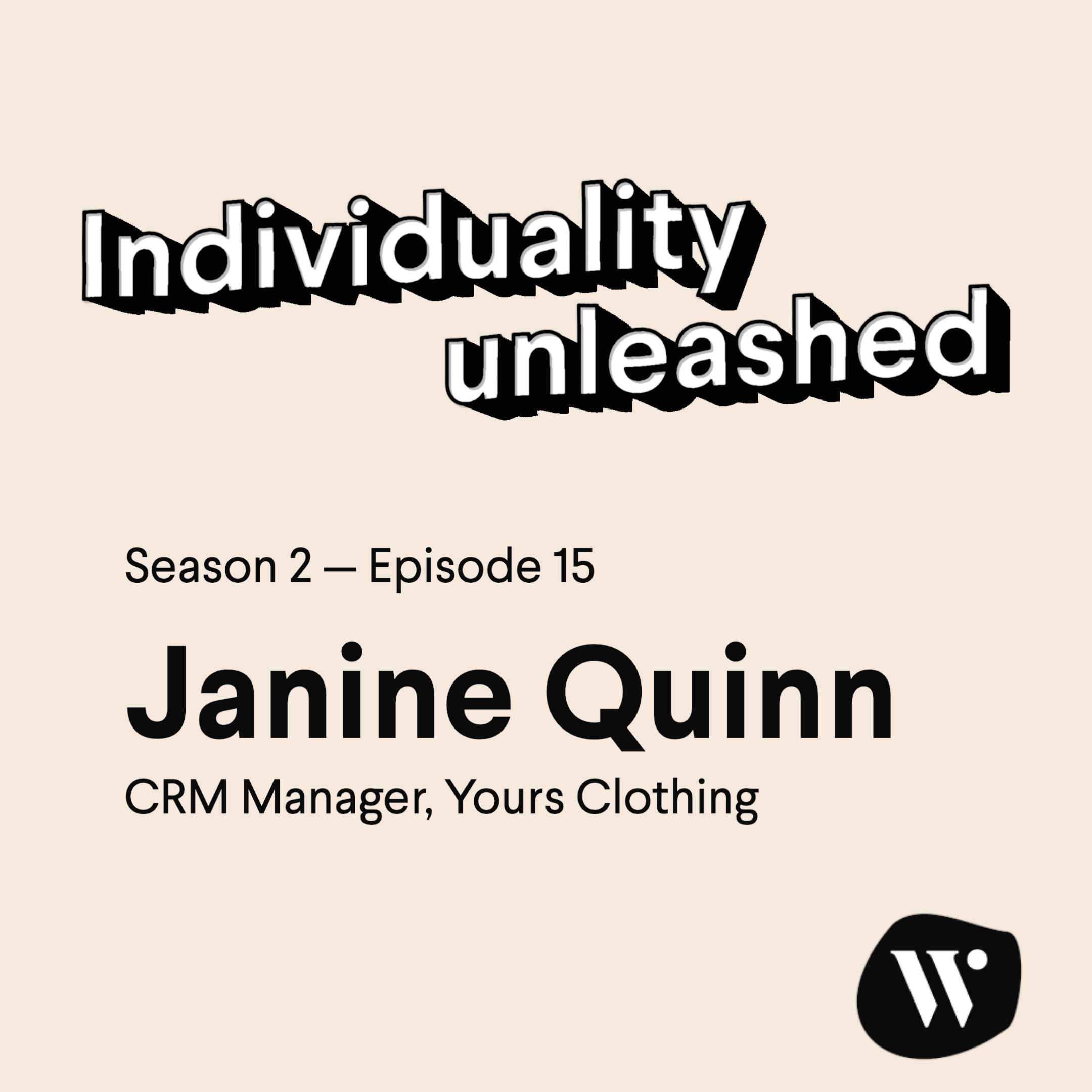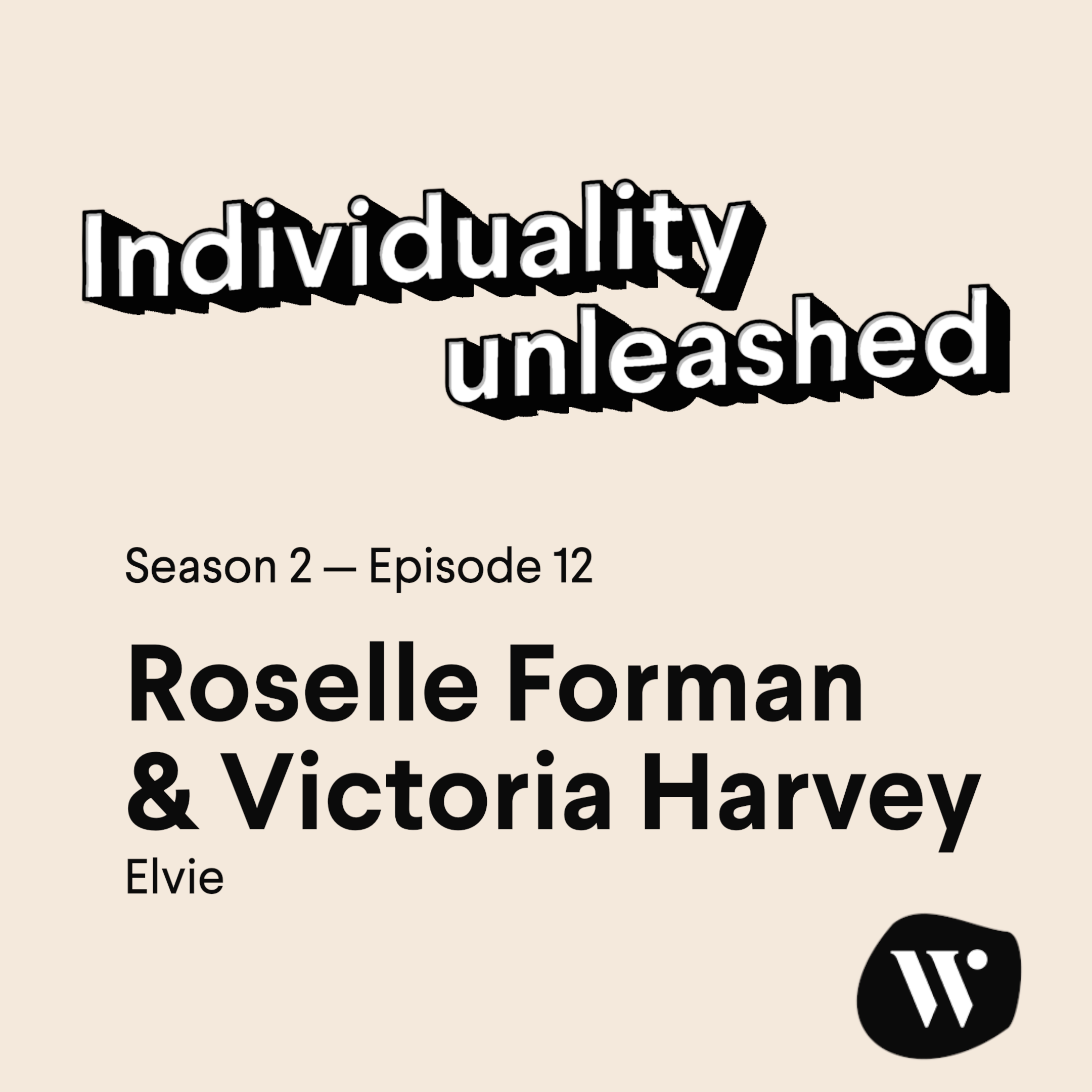Understanding Your Customer with Louisa Nicholls
- 0.5
- 1
- 1.25
- 1.5
- 1.75
- 2
Louisa Nicholls: Anyway, they started getting people up on stage and they dragged me up on stage. And then of course they talked to you. As soon as I open my mouth, they're like, " Oh, you're fancy." Oh, no. And everyone's looking. And then the woman goes, " Let's get some British songs on the floor." I think they've put on Oasis, and they were like, " We'd love you to sing Oasis." I'm like, " I don't know how to sing Oasis. I can try."
Vern Tremble: But you were already up there, so I'm sure you did your thing.
Louisa Nicholls: Exactly. " Oh, you're fancy."
Vern Tremble: I love that. That's such an American thing for us to do. I think it's a great way if we're recording. Have we started yet?
Crew: Oh, yeah.
Vern Tremble: That's just great. Well, you are here for another episode of Individuality Unleashed. I'm Vern Tremble, Senior Director of Marketing Communications at Wunderkind, and I am sitting here with the lovely Louisa Nicholls. Thank you for joining us, Luisa.
Louisa Nicholls: Well, thank you for having me, Vern.
Vern Tremble: Absolutely. Louisa Nicholls is an advisory board member and former CCO. She is here to chat with us today about rising digital cost, marketing team budget allocation, and the adoption of new marketing strategy. So I think it'll be a good one.
Louisa Nicholls: Just a small topic.
Vern Tremble: Just a little one. No biggie. As you guys can tell, we're in a new setting. If you're listening to us, I'm actually in London, so.
Louisa Nicholls: Live from London.
Vern Tremble: Yeah, this is actually my first time.
Louisa Nicholls: I know. Well, we were talking about where to go to get the full London experience.
Vern Tremble: And immediately, like an ignorant American, where's the Harry Potter World?
Louisa Nicholls: Right, exactly. Exactly. It's for an hour out of London. Vern is definitely going to go.
Vern Tremble: Right. You're in the place that inspired Harry Potter. And I'm going to go to it.
Louisa Nicholls: Have a Butterbeer.
Vern Tremble: Oh yeah, I have to have it.
Louisa Nicholls: You have to have it.
Vern Tremble: Go to platform nine and three quarters and do that thing.
Louisa Nicholls: Right.
Vern Tremble: Oh, man. I'm going to literally geek out. I'll take pictures and I'll put them up on our Instagram.
Louisa Nicholls: I think you need to do a podcasts just going around your experience in Harry Potter World.
Vern Tremble: Oh, I thought a part of this podcast was us talking about it.
Louisa Nicholls: Oh yes. Ruining the surprise.
Vern Tremble: Yeah, we'll save that for another episode, but let's jump right in because I think we obviously have a lot of interesting things to talk about. So first question, how have rising digital advertising costs on platforms like Google and Facebook impacted marketing budget and strategy for marketers?
Louisa Nicholls: I think to answer that question, you need to go a little bit back in time and contextualize it around the pandemic. If you look at retail, specifically where all the stores closed and all sales then pivoted online, suddenly marketeers were forced into a position where they had to take stock of their marketing spend and budget. And say, " Right, okay, where are we going to take that percentage that we spent supporting stores and driving footfall into stores and advertising and acquisition? And where are we going to put it so that we can drive those sales online?" And so, there was a huge shift overnight in adding more marketing budget to the likes of Google and Facebook because these were really the only channels at that time that you could continue to drive traffic to the website. So I think during that period of time, these companies, like Google, enjoyed a huge uplift from the spend of brands across the world. And then of course, once we started opening up again globally and marketers then were looking at their marketing budget, and saying, " Right, okay, we need to take that percentage that we were spending online and we now need to proportion it around supporting all the other areas of our business." I think there was such a huge drop- off and a shift in focus that even now these Google and Facebook, they're struggling now to re- benchmark and rebalance after that period of time. But I think what that also did was force marketers to really get into the detail and the weeds of where they're spending their money and really understanding as well the wider media landscape of where customers are consuming this content. Things like YouTube and certain advertisers were thinking more around how do you create bite- size content, digestible content for consumers. Rather than spending big budgets on above the line campaigns. And I think that has also opened up the narrative around what other third party solutions are there out there that we can use and plug in. So we spread the risk of dependency on a few big channels and start testing and learning a bit more. And I think, I hope that mentality continues around trying new things.
Vern Tremble: Yeah. I think what would be interesting for our listeners and viewers to know is in considering that mix that has to be applied, because we are post- pandemic, we have to have a broader mix. And obviously, the prices of the cost of Google and Facebook are astronomical, to say the least.
Louisa Nicholls: Yeah, fortune.
Vern Tremble: Dude, it's nuts. Where should marketers be putting their dollars specifically? Or should it be any one particular place? What do you recommend?
Louisa Nicholls: I think you need to spread your bets and spread your cost, but I think as well as it comes down to the profitability of the model. So rising costs in Google, if you can maintain that ROI, however you manage to do that and that profitability, then rising costs, you should then see rising revenues. If you can work within that model, but retailers and brands are finding more and more that they can't. And so, what is the other solution? I think with the privacy piece coming in and people slightly nervous around actually putting their eggs, this is a very British term, I think, putting their eggs all in one basket.
Vern Tremble: We say that in the US.
Louisa Nicholls: Oh, you say that? Some synergy.
Vern Tremble: Yeah.
Louisa Nicholls: But it's that mentality of actually we need to de- risk as much as we can. And as much as Google and Facebook and social media in general has TikTok came up in it, I think it was the fastest growing piece of social media ever, or social media company ever with its adoption rates. These things can come in overnight, but they can also disappear overnight.
Vern Tremble: Right, exactly.
Louisa Nicholls: And so, where do you focus so that you spread that bet? Because you don't want to be dependent on one avenue for driving revenue and traffic.
Vern Tremble: What would you say to a market that's like, " You know what, I'm putting all my eggs in the TikTok basket"? Is that wise?
Louisa Nicholls: You know what? The whole thing with that, you have to go where your customer is. So if you are a brand where your customer community is on TikTok, yes, then you absolutely need to start building your strategy for TikTok. If you are a brand where your customers aren't in that space, don't waste your money going in there because you need to be where the customer is. You can't drag them to it. But this rise around communities, and that's another thing from the pandemic around localization and people wanting to be part of something. And when you look at the Gen Zs, they are all about purpose and value, and they want to be working for, associated with, and buying from companies that are very clear on their purpose and values that match the consumers. And I think the more brands can think about that in their third- party portfolio and where they're spending their money and who they're working with, I think that goes a long way in the eyes of the modern consumer.
Vern Tremble: I agree. I think consumers can be a bit fickle, especially with where they consume their content.
Louisa Nicholls: A hundred percent.
Vern Tremble: Which is totally fine. You have MySpace, then Facebook, then Instagram, Twitter, and TikTok.
Louisa Nicholls: They're not loyal.
Vern Tremble: They're not loyal.
Louisa Nicholls: They're not loyal, and you need to be where they are.
Vern Tremble: You need to be where they are.
Louisa Nicholls: Yeah, because otherwise you're just wasting your time and it then becomes a vanity project. So a lot of people want to say, " Oh yeah, no, we are across all social media platforms." But the smart ones say, " No, that's not for us. That doesn't work for us, or this works for us." So there's no shame in saying, " Actually, Facebook is where our consumers are and really focusing on that." And likewise on TikTok. But I think, yeah, you need to really understand your customer.
Vern Tremble: So in addition to understanding where your customers are, what are some additional factors when considering when to decide where to allocate marketing budgets and resources?
Louisa Nicholls: Well, it's looking at it as in what's your always- on strategy? And then what are your firework moments? What are your moments throughout the year that you are really going to back? So are they mini campaigns, are they a few a year that you really do invest in? But I think more and more marketers are looking at that. It's slightly more boring, isn't it? Always on marketing. Yawn. If you are a creative, you want to get involved in the big exciting moments. But actually you are doing that at your detriment because customers are always on. And you don't know when they're going to be on, so you need to be always on. So I think there is definitely that piece around what that looks like, but also the content strategy that underpins that. So where you are needing that constant flow, whether it be user- generated content or you purposely created it for whatever reason, you need that constant flow of content coming through. And then it needs to be seamless across... Such a buzzword, isn't it? ... seamless end to end experiences. But it is true. It's that whole piece.
Vern Tremble: Let's dive into it though, because one thing that I've just really been adamant about, because I had a content here at Wunderkind, is creating content that not only provides entertainment but also value.
Louisa Nicholls: Yes.
Vern Tremble: I think it's two sides of the same coin. Once you get to a place where you understand; I understand my customer, this is what they want to see, this is what they want to learn, what do I do with it? That performance element of it, how should marketers be thinking about that? How do they deploy and proliferate the good content ideas that they assume, that they're guessing because they haven't tested this stuff yet, will actually drive value for them, for the brand?
Louisa Nicholls: Right. Well, I mean, you've touched on it there. It's about testing. It's about testing and learning, and it's going out and it's talking to your customers. They'll tell you. The modern customer, they like to be part of something. They like to feel like they are part of building a brand with you, and they're on that journey with you. So the content will speak for itself. And the user- generated side is really interesting. You can learn so much from what are your consumers putting out there themselves, and then what sort of content can you surface that then complements that.
Vern Tremble: Oh, that's good.
Louisa Nicholls: There you go. You can have that one for free.
Vern Tremble: That was good. That was good. Because that requires you to step away from the dashboards and the performance metrics, and really dive in to truly understand your customers.
Louisa Nicholls: Here's the thing, you can put some content out there and you can test it forever, you can have every dashboard going, but you don't know what you don't know. So you don't know what sort of content you could be putting out there unless you really understand your consumer and test and learn in that space. So it's what you don't know yet, but need to know, and then iterate on that.
Vern Tremble: I think that's great. It reminds me of a lot of the food industry brands in the United States and their Twitter and Instagram strategy. It's very, within the modern culture. A lot of times they comment on viral videos and it's both entertaining and also speaks directly to their audience.
Louisa Nicholls: Yes. Yeah, absolutely. And you need to be bold and you need to be confident.
Vern Tremble: Oh, yeah.
Louisa Nicholls: With this whole kind of cancel culture, people are taking a step back from doing what actually is amusing and funny and relatable, and it's understanding what your brand tone of voice is.
Vern Tremble: Correct.
Louisa Nicholls: Working within those guidelines, and then going out and doing something fun. I saw the other day, the McDonald's ads. I don't know whether they're UK ones or US, but a lot of people in the UK, after they've had a big night out, will go and get a McDonald's. So in London, for example, McDonald's is open until midnight. I'm not one of those people, obviously. They've got this suite of adverts now that they've changed. So it's, " Can I have a Big Mac, please?" But they've changed it as if you said it drunk. So they've moved the letters around. It's really clever, and it takes you a while. You read it and then you go, " Oh my goodness, I'm sober. And I can still understand what that sentence is." It's really clever. So they're starting to push the boundaries a little bit in that, and it gets people talking.
Vern Tremble: Yeah. In America we were saying, is that German? Is that... No. I'm American so I can make fun of us.
Louisa Nicholls: I can't. I love Americans.
Vern Tremble: Yes. I think that's great. And when you have that combination of, I understand the content strategy, I understand my audience, I understand where I can deploy to test. And then you get ready to deploy all of this thinking and all this strategizing. And you need money to do it, and you're faced with a CFO or other members of the leadership team that say, " Well, I don't understand why we would put money behind this. How should a market...?" Because they're dealing with it. The majority of marketers are experiencing right now slashes in their budgets, like aggressive slashes.
Louisa Nicholls: Yeah.
Vern Tremble: And it's going to hurt the bottom line. So how should marketers approach the conversations with their senior leadership in order to gain a hold of that budget in order to do their jobs?
Louisa Nicholls: If I had the silver bullet and answer to that, I think I'd be a billionaire. I've written five books and it'll be off somewhere. But no, I think, for me, it comes down to, it's very simple. You need to attach it to the wider strategy and vision. So if your company has a clear strategy with pillars, what are those pillars? And how can you then align your piece of work to underpin one of those pillars? Because you can guarantee that the leadership team, one of them, will be responsible for each of those. And if you can make them look good and you can build your strategy to support their wider division, that gives you a lot of traction. But when you're going in and talking to C- suites, you need to do the work up front around getting some advocates around the table that will advocate for what you are trying to do and really understand it. Because you're not going to get everyone understanding marketing because that's not their job.
Vern Tremble: Right, that's right.
Louisa Nicholls: But you need to bring it. It's all about the storytelling. And it's ironic because that's what marketing is all about. But you need to be able to do the storytelling internally and understanding what each person's motivation is. So the CFO will probably feel like they understand marketing, but they're constantly looking at their bottom line and looking at where to cut. The biggest cost savings in a business is always going to be looking at the marketing budget and account.
Vern Tremble: Yeah, that's true.
Louisa Nicholls: They're the first things that that's true kind of will be, because they're the biggest spend. And so, you need to be able to demonstrate to the CFO that you've got a really strong hold on profit and you really know what that payback's going to be. And I think that's why, certainly over the pandemic and coming out of it, there's been such a dependency on Google. Because if you are a retailer, you can attribute it to driving revenue and traffic. It's very clear- cut and you don't really know to understand it too much. You can see those numbers.
Vern Tremble: Right. Yeah.
Louisa Nicholls: Whereas when you're spending above the line in an advertising campaign, you've got someone trading, going, "Yeah. But how is that impacting sales because I can't see that." And I think the situation we are in at the moment where everyone's focusing on the short- term to get their businesses through this period of cost of living crisis, reducing consumer spend, it's very easy to say, " Right, okay, we'll just park the longer- term strategy piece here. We just need to keep the lights on every week."
Vern Tremble: But that's not the right move.
Louisa Nicholls: It's absolutely not the right move. And I think what we'll see coming out of this period, as we did with COVID, the people that have set up the business in order to focus also on the long- term are going to be absolutely the winners. Because I think these cycles of cost of living crisis or whatever it might be, will be every couple of years now. You might get over the first one, but you're not going to get over the second and third hurdle. So you need to sit back and rethink your strategy. And I think a lot of it is then not looking at marketing in isolation, and looking more broader across. If you look at digital, the whole digital ecosystem. So that whole end to end piece and how it all maps in, because you don't know at what point your consumer is going to be consuming your content or interacting with your brand. But creating enough experiences that feel seamless and easy, I think, is going to definitely going to win the day. That, and then just inspiring people. Making them laugh. It's pretty grim out there at the moment. So back to the McDonald's example. It's funny.
Vern Tremble: It's funny.
Louisa Nicholls: It's pointless and silly, but it's funny.
Vern Tremble: Right. And it's not taking itself too seriously. I talk about that often. I was actually on a podcast myself recently who talks about the importance of entertainment, it's a part of our remit, a part of our mandate.
Louisa Nicholls: Yeah. Let's make life fun.
Vern Tremble: Let's make it fun.
Louisa Nicholls: You're not here for that length of time on this land.
Vern Tremble: That's true.
Louisa Nicholls: Let's make it fun. Absolutely.
Vern Tremble: A hundred percent. I agree a hundred percent. So considering that, what would you consider the biggest challenges facing marketers today, and how can they overcome them?
Louisa Nicholls: Oh, that's a big question, Vern. I think there is definitely the budget. There is definitely the budget challenge. It's the allround marketer. So historically, you've got people that are very good at advertising, people that are creative, people that are into performance marketing. I don't think that goes anymore. You have to know it all. You have to understand the entire ecosystem. You can't just be in isolation just doing advertising. You need to understand that whole thread. And I think with young marketers coming in and growing their experience in the industry, I personally look out for people that have done roles in various different areas of marketing, not just one. And I think then you get into the debate around the CMO versus the CCO and what that looks like. And you then start thinking of marketing a little bit differently than the usual silos and different departments. Actually, everything is marketing and everything is content. So if you are a digital designer, if you are in UX, if you are designing for front- end websites and apps, in essence, you are representing marketing. You are marketing as well because you are putting the face of the brand and the business to the consumer. And so, you then think much broader than that. And I think one of the biggest challenges is if companies continue to work in silos to have a marketing department, a digital department, and you need something that brings it all together because it just doesn't work like that anymore.
Vern Tremble: That's so interesting. It sounds like something that we've all heard before, but I think it's one of those things where you get it, when you get it. But breaking down silos, we've all heard this.
Louisa Nicholls: Right.
Vern Tremble: We've heard it in school, we've heard it at work, we've heard it here, we've heard it at our job. We've all heard it, but true words have never been spoken in terms of a marketer's ability to drive success for their business. If a marketer, to your point, is not prioritizing and being pragmatic about creating unity between separate interdepartmental unity between teams to drive revenue and value together, they're going to fail by themselves.
Louisa Nicholls: Right. And it's a different mindset, isn't it? It's not about ownership. People get very precious. You hear that term kingdom building. " No, I own that." Well, here's the thing, you don't. No one owns digital. So there's Bob Cattle, he's a guy from the states, actually. I think he runs an agency. But I always steal his phrase. It's, " There is no digital strategy. There's just strategy in a digital world." And it's a bit like marketing. Everyone's responsible for how the brand comes across to the consumer. Everyone should be thinking digital first, whether they're creating a proposition, whether they're marketing something, everything. Even coming up with a new brand logo. It all has to be digital. It has to be digital first. And if you don't think in that way, I think you get singled out very quickly as a bit of a dinosaur now. But it all comes from the top. As you have more of millennials getting into more senior positions, they understand and have grown up in the digital native world more. And then of course, the younger generations coming up, they don't know any different. You'll naturally see that progression, I think. So I think there is a challenge for people, real senior leaders that are at the ends of their careers. It's how do they upscale themselves to understand this modern world?
Vern Tremble: Absolutely. And I think the adage that we're actually chatting about before we started the show today, I think you said it takes a village.
Louisa Nicholls: Yes.
Vern Tremble: Is what you said.
Louisa Nicholls: To raise a child.
Vern Tremble: Right.
Louisa Nicholls: Exactly. It takes a whole company to land a marketing campaign or a new app or a new solution, whatever it might be. It's not just owned by one department and it can't be. You'll fail. You'll fail overnight if that's the case. But people have to be open. So there's a lot of different elements to it, cogs, that when it all comes together. I mean, we sit here and make it sound very easy, don't we?
Vern Tremble: No, we do, really. We've got it all figured out. We do it every day.
Louisa Nicholls: We obviously do it all throughout our teams. But yes, that's Nirvana.
Vern Tremble: But we've seen it. We've seen it time and time again. And hopefully what we're presenting today is valuable insight that will help other teams that may be struggling, that are looking for, especially as we're dealing with the challenges with the economy, the challenges with privacy, the challenge just with cookie deprecation. You kind of take a step back, to your point, and follow that full channel of marketing. Louisa, I just want to thank you so much for joining us today.
Louisa Nicholls: Been a great pleasure.
Vern Tremble: Yes. I feel like this has been such a fun conversation. I'm going to go to Harry Potter Land.
Louisa Nicholls: Yes. Promise me that. Roast dinner at a pub.
Vern Tremble: On Sundays.
Louisa Nicholls: On Sundays, yeah.
Vern Tremble: I'll go do that.
Louisa Nicholls: We'll figure out a pub for you to go to.
Vern Tremble: Yes. And then the next episode that you're a part of, I'm going to show you pictures.
Louisa Nicholls: Amazing. I'll look forward to that.
Vern Tremble: Thank you so much, Louisa.
Louisa Nicholls: Thank you.
Vern Tremble: Absolutely. Again, that's another episode of Individuality Unleashed.
DESCRIPTION
Follow Wunderkind:
YouTube: https://www.youtube.com/@bewunderkind
Instagram: https://www.instagram.com/bewunderkind
Facebook: https://www.facebook.com/BeWunderkind/
Twitter: https://twitter.com/wunderkind
More from Wunderkind: https://www.wunderkind.co/resources/
Wunderkind is a performance marketing channel that delivers one-to-one messages across email and text at an unmatched scale.

